Traditional corner stores in general have been almost extinguished from the streets of Munich, surviving mainly in the form of immigrant grocery stores which unfortunately rarely stock organic items. However, there are a few survivers from the time when organic was an unknown word in supermarket chains: small supermarkets equipped with wooden shelves and as crammed to the brim as possible for orderly German souls. Usually they have everything you need for your daily life, just give you fewer choice between brands and varieties. Sometimes you'll find delicatessen the big players don't stock, and fresh produce is as fresh as from their competitors. Prices may be a few cents higher than the cheapest option in one of the retail chains, but you will be surprised to learn that many products actually are less expensive in a corner shop. In addition you may have a chat with the shop assistants, sometimes the owners themselves, and usually will be given a competent answer to questions you may have. Many of these shops have some tables and chairs where you can have a coffee, snack or vegetarian lunch.
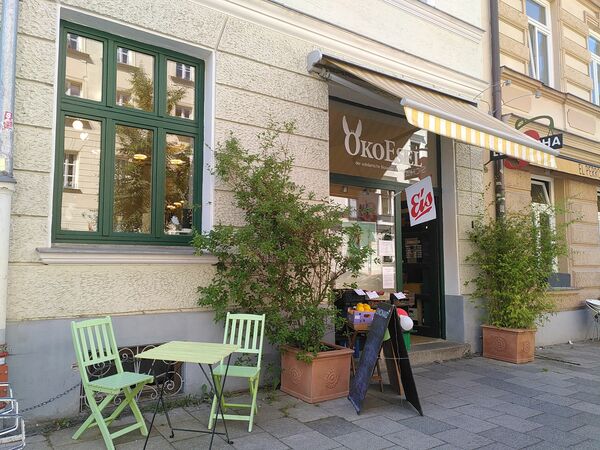
Groceries
The (to my knowledge) oldest full retail organic neighbourhood shop in town, theLebascha in Haidhausen, was run collectively by a bunch of friendly women until they retired. The shop would have been lost for the neighbourhood if not the distributor had been tieing up strings with the community supported co-operative Ökoesel ("eco donkey" is derived from a pet name for bicycles – "Drahtesel" – as they started up as a bicycle delivery service) in Neuhausen. Since 9th of July, 2022 the base line of the shop has been financed by membership fees (depending on self-assessment), but Lebascha continues to be open for everyone: None-members simply pay (a usually low) market-price, members are entitled to discounts (usually between 12 and 20 percent). With its (conventional) liquorice shop-in-shop (to my knowledge offering the largest selection liquorice in town) the Lebascha also is a hot tip for aficionados. An assortment of loose-weight herbs and spices, and a basic range of loose-weight cereals, nuts, legumes and grains, detergents and soap make the Lebascha the only surviving zero-waste shop near Ostbahnhof. Note that it is closed on Wednesdays and does not accept cards, but members may chalk up and pay later.
A few corners away from tube stop Implerstraße in Sendling the neighbourhood grocery Hollerbusch ("elderbush") offers
vegan and vegetarian lunch as well as yoga, pilates or singing lessons in a backroom.
The shop is also a delivery hub for the Munich based community supported agriculture project Kartoffelkombinat and offers gravity bins to refill dry food and reduce package waste.
Immigrant shops and traditional corner stores
While these small supermarkets cater for all daily necessities including fresh fruits and veges there's no such thing as an all-organic immigrant grocery focussing on the latter and supplementing with a selection of dry goods and delicatessen from their owner's place of birth. The nearest you come is Giesinger Fruchtmarkt near tube-stop Kolumbusplatz. As about three quarters of the fruits and veges as well as most of the Italian delicatessen are conventional you have to carefully watch out for the bio keyword. Apart from organic greens they also offer organic choices for olive oil, wine, pasta and cheese.
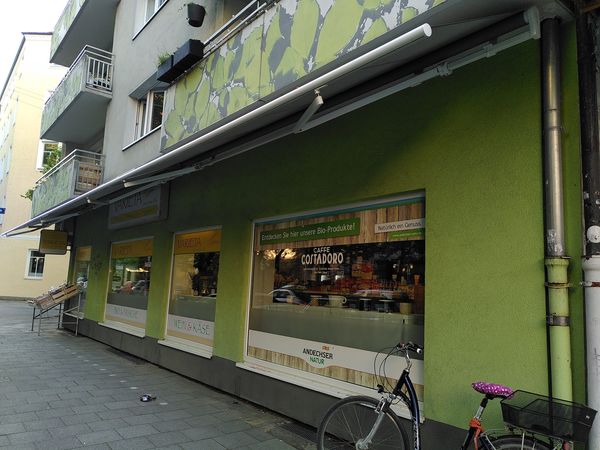
A similar owner-run mini market, Varieta am Körner Eck, is located in the Glockenbach neighbourhood, on Auenstraße between the Reichenbach and the Cornelius bridges. The bakery items are all organic, and organic products in the self-service area are clearly marked "bio" on the shelf. The shop offers a lot of directly imported Italian dry food, but unfortunately none of it in organic quality. Also most of the fresh fruits and veges are conventionally produced.
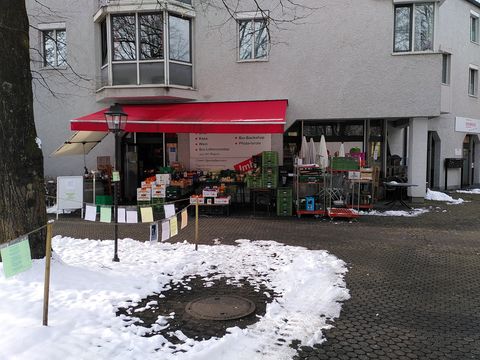
Remember the tales of parents or grandparents about the corner shop they went to as children to buy a single sweet which the shop keeper would put down on a list for their parents to pay later on when they came to shop bread, milk, veges and all the ingredients for the home-cooked meal? The spirit of these shops from the past you may find left in some immigrant shops and this is the reason why I list the Viktualieneck in Bogenhausen in this section. I learned about this crammed greengrocer's shop opposing the newly build neighbourhood of Prinz-Eugen-Park on my quest for shops supporting package-free shopping, but when I went there it turned out a likeable traditional supermarket offering
fresh fruits and veges, regional delicatessen, bread and rolls, wine and all kinds of food. About half of it is organic, namely all the bakery products and certainly more than half of the pre-packaged food. Most of the fresh fruits and veges come from a conventional local market garden
– the turnaround for organic greens wasn't good enough among his customers, and his emphasis was on avoiding waste the shop keeper told me. Package-free shopping is possible for all fruits and veges as well as all items from the bakery, meat and cheese counter.
I cannot tell you whether the shop chalks up for trustworthy customers, but if you are in the vicinity support this shop instead of the supermarket chains nearby.
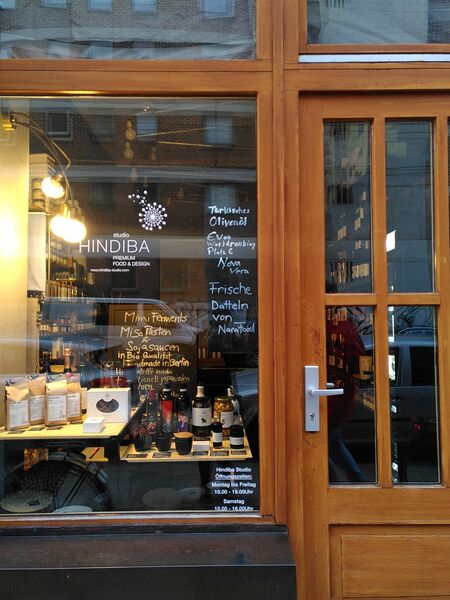
Delicatessen
The upmarket contrast to these somewhat shabby grocery stores is naturally to be found in the posh neighbourhood of the Lehel:
Studio Hindiba offers oils, herbs and condiments, olives, all types of rice, the famed ferments of Berlin's Markus Shimizu, a carefully selected range of wines and other predominantly organic delicatessen. For the smaller purse it may be just a beautyful shop to marvel at, but if your budget isn't painfully tight it's the perfect place to shop a foodie gift for someone special.
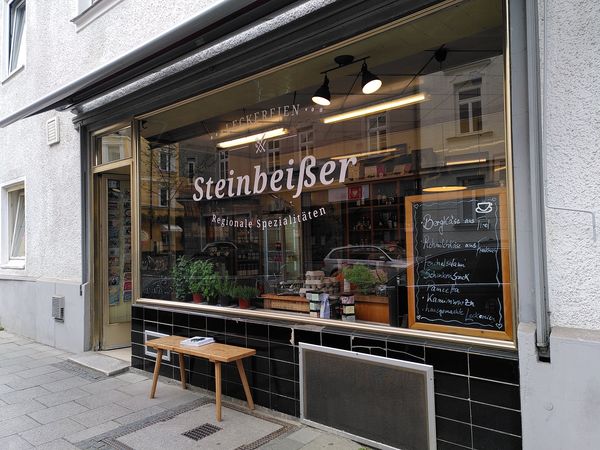
A few steps from Wiener Platz you'll find Steinbeißer, a cosy owner-driven deli advertising 'regional specialities'. Take this with a grain of salt – the organic Italian olive oil and Scandinavian candies (not organic) are small-scale produce specific to their region of origin, but certainly not from the greater Munich area. Most meat products come from small-scale Austrian farms which are likely to produce according to near-organic principles. Certified organic products unfortunately do not dominate the pleasantly arranged tables and shelves with artisanal products – predominantly foodstuffs and wine, but you may ask the owner about the provenance of his fare.
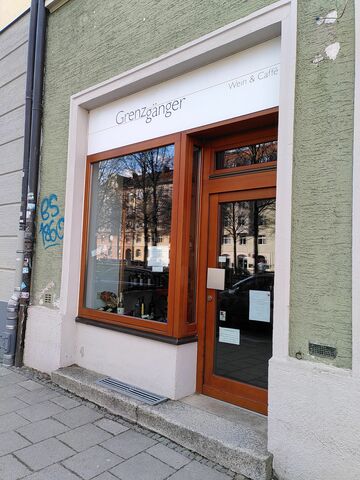
Wine, pepper and coffee from carefully selected small-scale producers, that's the focus of Grenzgänger ("border crosser"), a lovely shop directly located at the beautiful Bordeaux-Platz in Haidhausen, just opposite Café Reichshof. When you come here during the cold season you may find yourself welcomed by the warmth of a fireplace, and you can get a speciality coffee (14 types of Arabica to choose from) into your own mug. During covid-19 restrictions cream-ware cups aren't provided, so if you come without a mug you will be charged an extra 20 cent for a plastics-free one-way cup.
Unfortunately most of the products aren't certified organic, with the notable exception of the Demeter-certified honey and bee wax candles of a local beekeeper who is working in accordance with biodynamic principles, i.e. the gold standard for animal welfare.
Specializing in cheese and supplements – wine, olives, oil, herbs, condiments, to name a few – the Luigino's booth in the Southern part of Viktualienmarkt, opposite the crossing of Reichenbachstraße and Blumenstraße is the perfect place to shop for a picnic or the no-frills romantic candle light dinner. Once an almost entirely organic cheese booth the percentage of organic products on sale has diminished during the past years: mainly due to the advent of artisanal, yet conventional Italian cured meats, partially due to a lesser focus on organic labels on the selection of cheeses.
When ordering an Italian-style sandwich to take away you may wish to enquire about the ingredients and probably stick to the vegetarian ones since the Italian cured meat products usually are not organic.
The owner once run a delicatessen in Maxvorstand which was replaced by an organic ice-cream parlour in 2018.
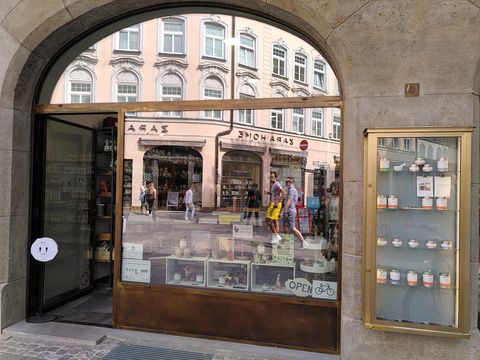
Herbs and spices
Not exactly a spice bazaar, but a pleasant spice and herbs shop Gewürze der Welt ("spices of the world") had a long tradition on its former location in Thiereckstraße in the very city centre, but when the historic Ruffini house re-opened after a two-year period of restoration work in 2020, the shop moved back to its roots in the Sendlinger Straße (now) pedestrian area. As the name suggests you will find a world of spices, herbs, blends and condiments, a notable part of them in organic quality.
Munich's first organically certified herbalist is tucked away in a non-descript side road near Sendlinger-Tor-Platz, just a few steps aside the remnants of the Glockenbach neighbourhood's famous queer bars. Light and friendly the
Kräutergarten offers all kinds of organic dried herbs, spices, natural cosmetics and the like.
Sonnentor, the leading Austrian producer of organic herbs and spices, has a shop in Munich, too: Located in the basement of
Stachus-Passagen, a generally boring shopping mall a level above this central urban train and tube station, it's probably not the shop that you'll find by accident while taking a stroll through the city. Apart from herbs, spices and condiments they also have a selection of natural body care – an easy place to shop for a nice last-minute give-away.
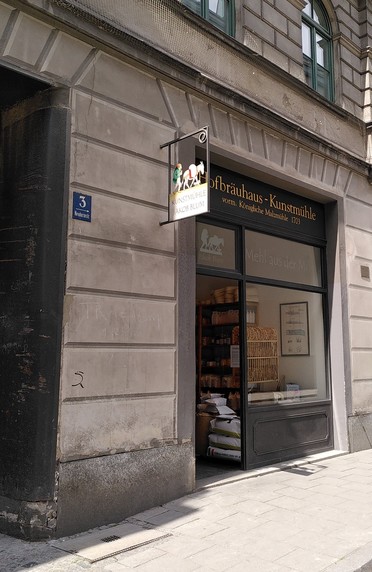
Special shops
The only operating corn mill in Munich with its cosy mill shop is located in a small street a few steps from the tourist hotspots of Marienplatz and Hofbräuhaus. The Hofbräuhaus-Kunstmühle offers all types of flour, bruised grains, semolina, bran and cereals, predominantly of corn grown in the region. An increasing number of these artisanal products are organic, so watch out for the 'bio' keyword on the classic paper bags or the listings of the web shop. These products are also the base ingredients for the artisanal home bakery E. Knapp & R. Wenig next door where you can buy hand-made bread and rolls based on traditional, predominantly Munich recipes. The mill shop also stocks a selection of organic dried fruit, olive oil, raising agents and other baking ingredients as well as dry breads like South-Tyrolean Schüttelbrot.
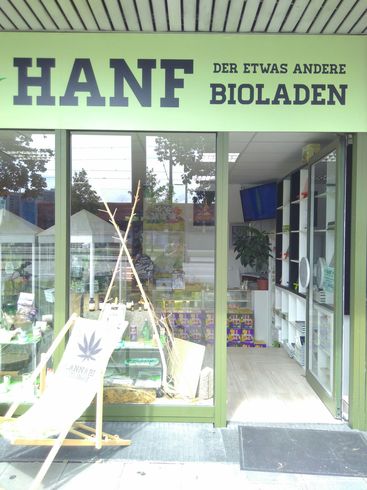
Another very special mono-themed shop, Hanf – der etwas andere Bioladen, sells everything containing THC-free hemp: beer, lemonades, cookies, bars, tea, ice-cream, chocolates, body care, clothes, liquids, pet food and more. Although the name suggests it not all products are certified organic, especially not in the non-food range, but the sheer number of goods based on this versatile plant is quite impressive. The main shop (which is closed on Mondays) isn't located in the most inviting part of town but can easily be reached from Leuchtenbergring urban train stop. But wait: in 2019 a second one opened at a tourist-friendly location between Isartor and Marienplatz.
Ceased to exist
The following places shut down and were replaced by other, not organic ones. So don't be confused when you find references to them on the web:
2024-06-01 10:45:00
[Munich, Haidhausen, Schwabing, Lehel, Maxvorstadt, organic, lunch, snacks, coffee, supermarkets, deli, grocery, Italian, vegan, hemp, flour, mills, fashion, bodycare, spices, herbs, delicatessen, eatery, zero_waste, unverpackt]
Link

Dresden's Wilhelminian neighbourhood of Neustadt is dominated by independent shops and venues, many of them run by female entrepreneurs as documented by an art project of local photographer Christine Starke. So it comes as little surprise that it is here where you have the best chance to discover a lot of gems, driven in accordance with the personal principles of the shop keeper which often include social and environmental aspects. Keep your eyes open, and you will discover a lot more than I have to suggest here.
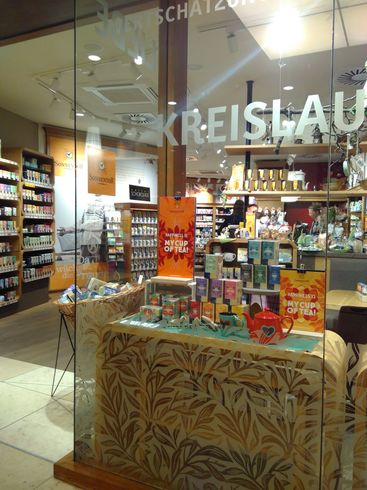
Herbalists and beauty
The old town does not have much to offer in terms of independent and surprising shops, and the Altmarkt-Galerie mall is as boring as these shopping centres usually are. A notable exception is the Sonnentor shop directly located at the mall's entrance at Postplatz, next to the tram-stop at Wallstraße. Franchises of this Austrian producer of organic and fairly traded herbs, teas, condiments, bodycare products and spices are usually located in malls or main shopping areas, neatly designed heavens offering products that are good for both, you, and the farmers and producers involved when you're in the mood for shopping.
If you're on the outlook for herbs, remedies, bodycare and food items based on ingredients described by medieval healer nun Hildegard of Bingen pay a visit to the Marone herbalist shop on Bautzner Landstraße directly located at the east-bound tram stop Pulsnitzer Straße. Not all of the products on sale (which among others include chestnut products and a small selection of biodynamic wine) in this small specialist shop are certified organic though.
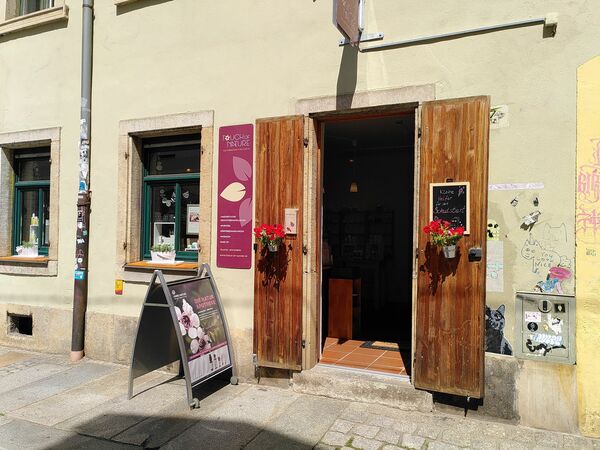
Leaving the tram tracks and entering the more pedestrian-friendly quartier natural and organic bodycare products can be found at the
Touch of Nature beauty parlour cum shop in Böhmische Straße east of Rothenburger Straße. Note that this shop is
closed on weekends.
Bicycles
A few steps from Touch of Nature there's a second hand bicycle shop cum workshop, Zwout! (formerly Elbcycles), where you can buy a used or recycled bike if you're staying longer, or get your own one fixed.
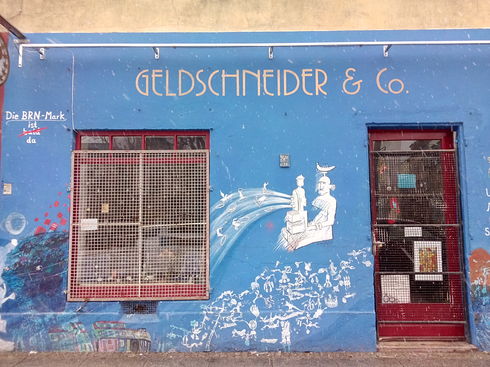
Jewellery
If you follow Böhmische Straße until it ends at Alaunstraße. A
luminous blue wall indicates the location of the Geldschneider & Co. steam-punk workshop. Among others you will find beautiful jewellery made from recycled parts of abandoned analog wrist watches. The place has somewhat erratic opening hours, so step by when nearby (if you need to plan ahead: Saturdays seem a safe bet). If closed during regular German shop opening hours you may call the phone number given on the entrance door.
Fair trade
As in many other German cities the first address for colourful gifts as well as organic sweets, spices and condiments are fair-trade shops founded as grassroots activities by Christian parish members in accordance with the conciliar process of mutual commitment (covenant) to justice, peace and the integrity of creation (JPIC). As the host for pioneering regional ecumenical plenums in 1989 and 1990 the city of Dresden has been playing an important role in this process. The spirit of this movement lives on in local fair trade initiatives like Quilombo which for almost 25 years had run a fair-trade shop in the entrance area of Dreikönigskirche in Hauptstraße which played host to the first democratically elected local parliament in Saxony after East Germany's peaceful implosion in 1989. Today the initiative still has a shop in the neighbourhood of Löbtau while their former place in the "Haus der Kirche" ("house of the church") has been converted into fair-trade
Cafe Dreikönig.
Sharing their roots with the Quilombo NGO the team of
Cafe Aha opposite Kreuzkirche runs a fair-trade shop in the heart of the city. It is located in the basement of the cafe and offers an impressive selection of fairly-traded gifts, body care and dry goods. This initiative also runs a fair-trade ...
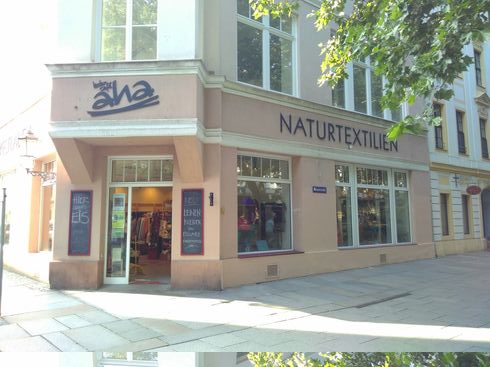
Fashion
... boutique, Aha Naturtextilien, on Hauptstraße, offering a great selection of fairly traded fashion made from natural materials. Here you will also find a good selection of stationary, jewellery, eatable fair-trade goods and more. By the way: the name "Aha" is an abbreviation for "trade/act differently" ("anders handeln" in German), and implies a huge effort in not only selling fairly traded goods but offering fair conditions to their own employees.
Another centrally located fair-trade shop specializing in fashion and household accessories as well as coffee and chocolates is Contigo near the central train station.
For more ethically produced and sustainable cocooning items visit Tranquillo, a likewise colourful fashion-and-things boutique cum fashion label in the Neustadt neighbourhood, at the crossroad Louisenstraße/Rothenburger Straße. They produce their own women fashion entirely made from organic textiles focussing on basic colours – if you like Aha Naturtextilien don't miss this one. There's also a sustainable furniture outlet cum cafe on the other side of the train tracks to Neustadt trainstation.
Dresden's first fashion boutique exclusively selling fairly produced clothing from fairly traded, organically grown materials is dubbed
Populi and
can be found at the Western end of Louisenstraße, just before you reach the tram tracks of Königsbrücker Landstraße.
Both, streetware, denim and designer labels can be found here, for men and women. The interior of the shop is to a great deal made from upcycled furniture.
Students and nerds find fairly traded organic cotton t-shirts and sweaters with unique scientific prints at Unipolar, and everyone else organic streetware for both, men and women. This small, Dresden-based fashion label is the brain-child of a former physics student. The original store between the Bahnhof Mitte train station and the "Carl Maria von Weber" College of Music does no longer exist. (But if you already are here: the VG warehouse next to this old location has a well-assorted organic fashion section upstairs.)
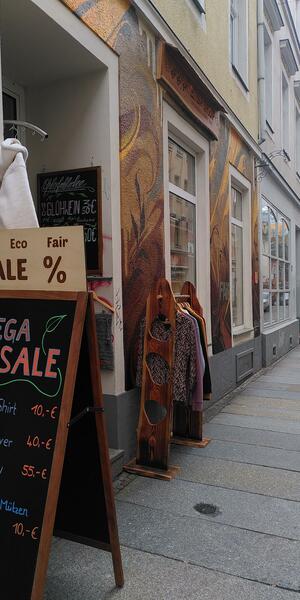
As of 2024 Unipolar consists of two shops on both sides of Rothenburger Straße in the Neustadt neighbourhood, one selling clothing, and the other shoes and sustainable household gear. Finding the shops is easy: Simply spot the bath tub opposite the tram stop.
More colourful organic streetware, less nerdy prints, and open late on Fridays and Saturdays – that's
El Dorado Street Fair in Alaunstraße.
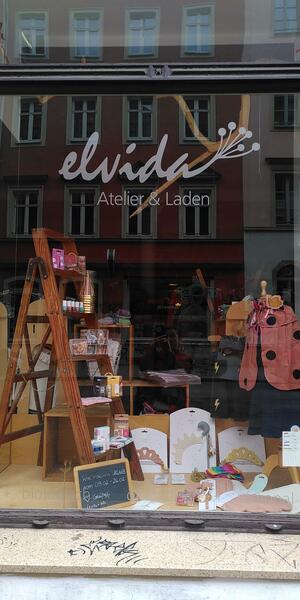
Before the arrival of noisy and cheap looking street food shops this street, the entrance to the Neustadt neighbourhood, was populated by numerous owner-run, carefully curated fashion boutiques and second-hand shops catering for a diverse crowd. Some of them have been surviving, and I'm more than happy that this shop venue, after the closing of El Dorado's predecessor, Invito, remained an organic fashion boutique.
Babies and toddlers
If you are on the look-out for beautiful, not overly sweet organic fashion for toddlers and smaller children or simply for beautiful organic garments step by Elvida in Louisenstraße approximately opposite Planwirtschaft pub and cafe. There you'll find the small flagship store of a Dresden-based sustainable kids fashion label – and a source for organic sewing things.
The following places shut down, so don't be mislead when you find references to them on the web:
- Quilombo, Haus der Kirche, Hauptstr. 23 (fair-trade)
- Baum&Wolle, Alaunstr. 13c (fashion)
- Ex Animo, Martin-Luther-Str. 17 (fashion and things)
- Hüpenthal Boutique, Bautzner Str. 63 (bespoke tailor, I miss your beautiful collars, r.i.p., Herr Hüpenthal!)
- Invito, Alaunstr. 20 (fashion, suceeded by El Dorado Street Fair)
- Lipfeins Lieblinge, Rothenburger Str. 1 (organic lipcare, factory outlet – their products can of course be obtained online or (e.g.) from one of the VG supermarkets)
- LouisdoOr, Louisenstr. 4 (sustainable toys and baby clothing)
- Tranquillo Outlet,
Louisenstr. 45 (organic fashion, visit them here)
- Unipolar Mitte, Jahnstr. 1
(streetware, visit them here)
- Un-Kraut, Martin-Luther-Pl. 12 (herbs and spices)
2024-02-21 15:30:00
[Dresden, Neustadt, shopping, organic, fair, fashion, shoes, spices, tea, herbs, delicatessen, gifts, upcycling, steampunk, bodycare, furniture, household, children, toys]
Link

As a tourist you will most certainly head for the old town, walking down the Hauptstraße ("main street") pedestrian street. While the western part of this street is inhabited by the ever-boring major chains, the eastern part with its small-scale owner-run shops is definitely worth a shopping spree, preferably to enterprises striving to sell sustainable, often fairly traded goods.
Cocooning and body care
Looking for dedicated environment-friendly kitchen and bathroom utensils, toys, fashion accessories, stationary, gifts or design items you must not miss out the green design department store
GOODsHOUSE a little west of Schiffsgasse. The shop itself isn't visible from the main street -- walk down a little aisle into the backyard to find a lovingly arranged two-storey shopping paradise. The staff is friendly and helpful, yet not intrusive and will happily offer to order items not in stock.
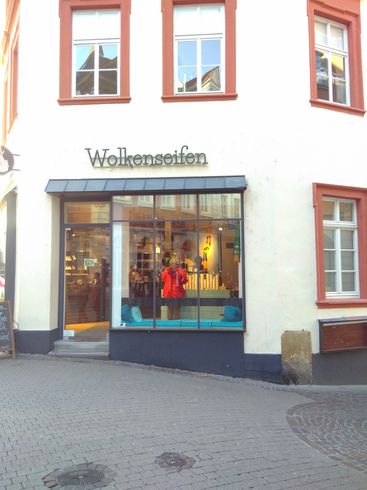
A few steps further west, at the corner with Heumarkt an equally carefully designed cosmetics boutique dubbed Wolkenseifen ("cloud soaps") is the flagship store of a local near-natural cosmetics manufacturer. In addition you'll find
(certified) organic and natural cosmetics brands usually not to be found in your nearest organic supermarket -- among them Chia, Madara, or Khadi --, and a great selection of zero waste body care like hair and body soaps, solid shampoos or solid toothpaste.
Shoes and fashion
Fair and slow fashion seems to be quite strong in Heidelberg where even otherwise conventional clothes boutiques like
Bofinger in the main street trade in fair and organic labels like Armedangels. My stay was too short to pay a visit to all the places on my short list, but I managed to have a glimpse inside
Tutta Natura selling sustainably produced French shoes and women's clothes for lovers of classic eco-design in the Plöck running parallel with the main street.
November 2018 saw the re-opening of former fair fashion store cum cafe Friedrich as a Glore concept store offering organic fashion for all, women, men and kids as well as a small selection of organic body care.
Fair trade shops
Heidelberg is home to a number of community-driven one-world shops selling fairly traded fashion accessories, household items, dry food, sweets, coffee and tea, the latter often certified organic. One of them is Una Tierra at the market place Neuenheim, another one
the Weltladen in the old town with a small cafe, offering fairly traded coffee drinks, cocoa or tea while you crawl the shop or let you inspire by the bookshelf.
More to try
Here's a list of shops which I had on my list for research but didn't manage to visit myself. Let me know about your experience!
Closed
2023-11-18 21:00:00
[
Heidelberg,
shopping,
organic,
fair,
fashion,
spices,
herbs,
delicatessen,
gifts,
upcycling,
bodycare,
coffee,
cafe,
shoes]
Link

Tuesday, 14 November 2023
Eating out organic in Mannheim is different than in other cities: First it means vegetarian and vegan-friendly (almost) without exceptions. Second there seem to be no places serving national kitchens – no German Wirtshaus, no French cuisine, no Turkish fastfood and not even a mock Italian place. And finally organic here means organic for everyone, not just for a wealthy, hip and urban clientele. As a result you may miss cleverly designed cool places as much as refined coffeehouses or classy gourmet restaurants. The good news is that Mannheim's organic restaurants and cafes are extremely affordable.
Inner city
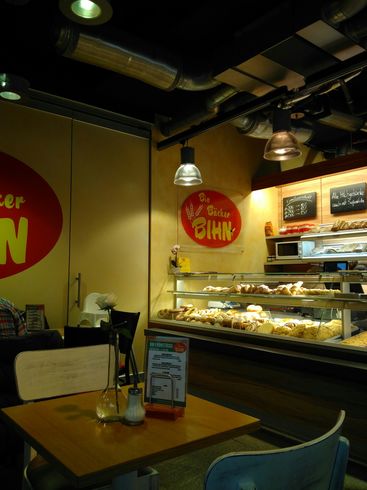
For breakfast (or a snack or coffee during the day) head for Bio-Bäcker Bihn on the ground floor of the Stadthaus housing the city library and other communal facilities and staging the city's part of the Mannheim/Heidelberg International Film Festival. Enter the complex from the north-eastern entry facing Paradeplatz, and you'll find the unpretentious bakery cum self-service cafe at the right hand site.
The breakfast options served on work- and Saturdays until noon are sufficient for two not too hungry ones; you can choose from a menu which also boosts three vegan varieties or combine yourself. Coffee or tea on the go is possible, but you should rather bring your own refillable cup (or buy one on the spot) as a one-way paper beaker righteously will be charged with 25 cents. For breakfast, lunch or in between freshly prepared sandwiches are available, too (though no longer in the evening). The coffee comes from an automat, and the rather cheap-looking interior design maintains a low threshold. If you come with a family or friends pay together which will give you a small discount (10% above 20 €, 12% above 30 € and 15 percent of a total above 50€).
If you fancy a better coffee in the Schwetzingerstadt neighbourhood you may step by Eddie's, the city's zero waste grocery store.
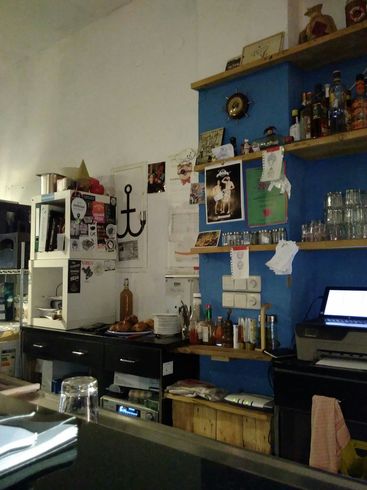
For an organic coffee, spritzer (of fruit juice and sparkling water) or wine head for the north-western neighbourhood of Jungbusch. The vegetarian, vegan-friendly gastro pub Kombüse serves Mexican-style fastfood as well as a daily changing soup and main course, on availability (but not reliably) using organic veges. It keeps open until late and may give you an impression of the city's subculture. The place also offers a take away service, but kindly invites guests to bring their own re-usable cups and jars. You will be charged the extra expense if you insist on one-way packaging.
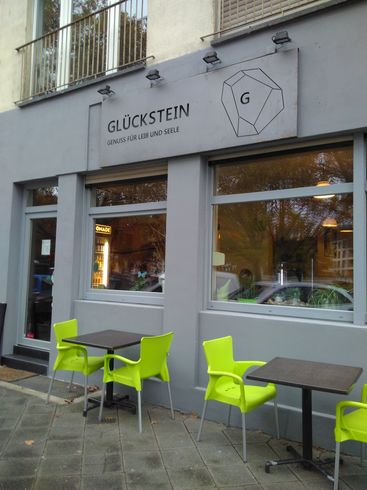
South of the main train station
Interestingly the hippest and most expensive places aren't located in the very city centre but south of the railway tracks. The first one is the Glückstein in Lindenhof south of the railway tracks, a short way from the banks of the river Rhine. This organic vegan restaurant took over from Frankfurt-based raw eatery Rohkosteria.
You can choose from the menu which still contains a lot of raw dishes
(bowls and salads, burgers, wraps, falafel, vegetable "pasta", smoothies, shots, cakes and cookies), and two warm and filling daily specials at 8 EUR (I had a simple, yet very tasty lentils-based lasagna).
Although the place is open in the evenings no alcohol is being served here, and you can also have caffeine-free lupin-based "coffee" drinks.
The pleasantly designed interior and the unexcited atmosphere make it an ideal place to stay for a while.
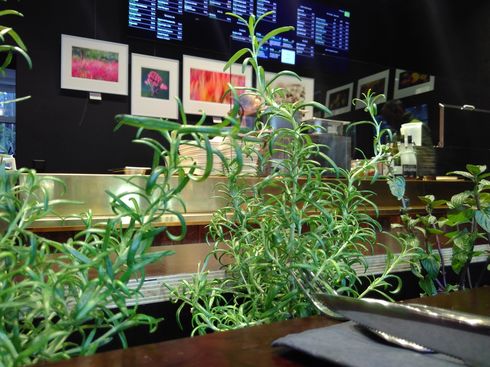
If you have a bicycle take the chance to visit the neighbourhood of Neckarau where you will find two real gems: The first one opened in 2019: Hedonist is another modern, thoroughly designed eatery, friendly, but less homely than Glückstein, rather the type of place where you expect busy business people to have a recreational and healthy lunch break (but no worries, the audience isn't that uniform). You can buy everything to take away, much of it in returnable glass jars with a deposit of 2 EUR – salads, desserts, falafel and burger sandwiches, pasta, but also German-style pork and fish main courses. On weekdays a set menu consisting of a main course and a dessert is available at lunch time. On the Thursday I was there it was (very filling and quite dry) falafel with some salad, a spoon of pickled beetroot, a small amount of lentil salad, prefectly crisp potato chips and tasty (though too cold) potato salad. While the food is being served guests may collect the generous glass of dessert from the fridge. I had the so-called cheesecake which wasn't actually a cake but a cheese cream with oranges and sponge biscuits. There were also tiramisu and blueberry or raspberry mascarpone cream. The entire vegetarian meal came at 8 EUR, if you choose a fish or meat main course the price tag increases to 11 or even 15 EUR.
There's also a rack of selected wines, pickles and condiments to buy home. The place is fuelled by renewable energies.
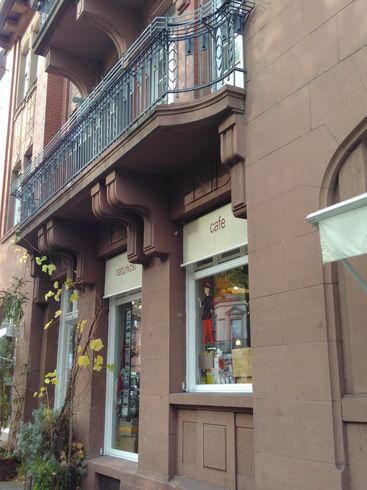
Right next to the Hedonist you'll find the second place, a carefully curated and decorated cafe cum wine shop cum organic delicatessen dubbed Bittersüß ("bitter sweet"). Too beautiful to call it an owner-run organic grocery store you can buy all daily necessities here – fresh fruits and veges, and dairy products as well as organic bodycare. But on top of all this you'll find French sweets, selected cognac and other spirits, an abundance of wine, delicate chocolates, and last but not least the delicious products of the organic ginger bread bakery Friedmann in the same neighbourhood. Between noon and 2pm vegetarian lunch is being served on weekdays – the daily changing menu you'll find on a hand-written piece of paper at the cashier desk.
North of the Neckar river
Bicycle lovers must not miss out the city's first bike cafe in the Neckarstadt north of the river Neckar. The
Café Flamme Rouge (dubbed after the red flag displayed one kilometer before the end of a bike race) was established in 2005 and serves
organic bread and rolls from the
Lummerland organic bakery with biodynamic vegetarian spreads, partially organic coffee, home-made pesto, pancakes and a lunch dish (the menu changes on Mondays and Thursdays).
Also located in Neckarstadt Ost the
Café Pfau
has a focus on regional, but unfortunately not organic ingredients. Organic products are used in the kitchen here and there, and the milk is always organic, though neither the (locally roasted) coffee or tea.
More to try
The following place I had on my research list but could not make it there:
No longer organic
The Wohnhunger gifts and things shop does no longer offer organic soups or stews for lunch, and does not use organic milk for their coffee drinks. The coffee itself may occasionally be organic (as they also sell organic beans) but usually isn't.
Closed
Of the following places you may find remnants on the web but be assured: They do no longer exist.
- Café Vogelfrei, C3, 20
- Bio-Bäcker Bihn, M3, 7(moved to Stadthaus)
- envita Bio-Restaurant, Im Stadthaus N1, 1 (replaced by organic bakery Bihn)
- Hellers Vegetarisches Restaurant & Café, N7, 13–15
- O’ Dog Café, M5, 8 (Hot dogs)
-
- mundgrün veganerie, T3, 7 (vegan) (preceeded by Sonnenblume Naturkost)
- Veggie-Stadel (formerly Bio-Stadel), Lindenhofstr. 62 replaced by Rohkosteria
- Rohkosteria, Lindenhofstr. 62, replaced by Glückstein
- Bio-Bäcker Bihn, Kurfürstenstr. 7
2023-11-14 20:00:00
[Mannheim, organic, breakfast, lunch, coffee, cafe, eatery, vegan, vegetarian, restaurant, bakeries, ice-cream, delicatessen, wine]
Link

Saturday, 16 November 2019
If you prefer to set out on a shopping spree on a bicycle and prefer a rented bike that is not tracking you pay a visit to Fahrrad Schieber, a more than one hundred years local bicycle workshop located a few steps from the Wasserturm landmark within the squared part of town, the "Quadrate".
For 10 EUR a day (as of 2019) you will be provided with a well maintained used bike. If it against all odds breaks during your trip, do not hesitate to step by, it will be fixed promptly.
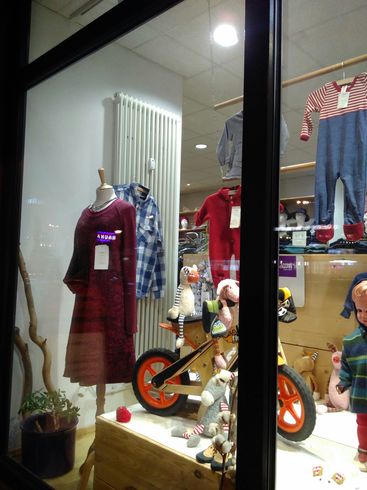
Founded almost 25 years ago your first stop could be HautNah, a fashion boutique specializing in ecologically and fairly produced clothes made from natural materials. The shop is a member of the
International Association of Natural Textiles (iVN) and aims at those looking for classical long-living cuts rather than at cutting-edge fashionistas (for trending fashion you may try the shops listed below). Needless to say that HautNah also offers an assortment of healthy outfits for babies and toddlers.
For shoes proceed a few steps along the Kaiserring to Fußspur ("foot trace"), a small local chain specialising in environmentally friendly produced and European-made shoes.
Leaving the ring road and entering the Quadrate through Kunststraße you'll find a tea shop of the
Tee Gschwendtner franchise. Although this specialist chain is selling conventionally produced teas and tisanes in the first place its shops have proved to be a trustworthy source of organic teas and herbal infusions for years. You can buy all kinds of loose teas and herbal infusions as well as high quality tea bags and even pre-fab iced teas, and there will usually be organic options. Although most teas will be filled into bags before your eyes there's always a minimum quantum you have to buy (usually 50 or 100 grams), and you have to buy standardized packages (bigger sizes being 250 or 500 grams).
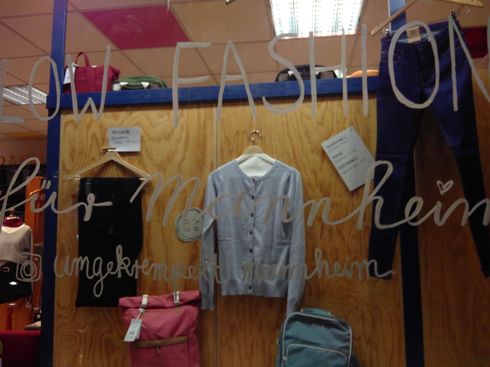
Even longer west in the Quadrate area, located between the castle and parade square the new Umgekrempelt ("rolled up" and/or "turned inside out") clothes boutique offers both, fairly traded and organic slow fashion as well as a repair service and upcycling workshops. In addition you'll find a lot of accessoiries and gifts here, and even plastics-free degradable glitter. Note that this likeable shop keeps closed both, on Mondays and for a (rather late) lunch break.
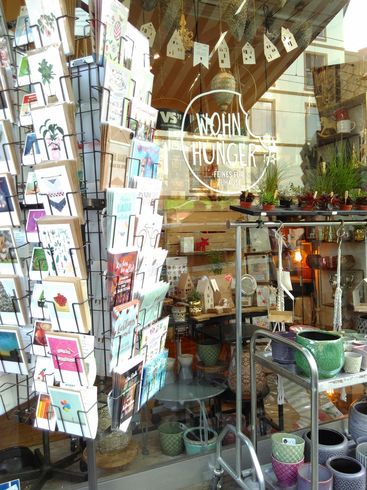
Leaving the Quadrate for the eastern part of town the Wohnhunger gift shop next to Eddie's zero waste supermarket offers
a selection of organic delicatessen like coffee, soups, chocolates, liquors, herbs and spices,
some zero-waste items like natural soap and cotton dish washing clothes and a lot of other cosy things.
Unfortunately the organic coffee isn't used at the coffee bar, and the milk for the coffee drinks isn't organic. About three years ago the shop also offered an organic soup or stew for lunch, but these are songs from the past.
On your way you'll also pass Weinrefugium, an upmarket, carefully designed wine shop offering a good selection of natural and organic wines. (For more and only organic wines visit the Bittersüß delicatessen in Neckarau.)
More to try
Here's a list of shops which I had on my list for research but didn't manage to visit myself. Let me know about your experience!
Greenwashed
The city's
online tourist guide suggests to get yourself a "bio" picnic basket for a stroll at the embankments. Don't fall for it! The only organic items that come with this "Wellness-Korb für Vegetarier" are two bottles of the organic bionade soft drink:
- Die Metzgerei, Rheinparkstr. 4 (bistro in the Lindenhof neighbourhood)
Closed
The following places do no longer exist, although you still might find references to them on the web:
- Fairbrothers, C 8, 18 (fairly traded organic fashion)
2019-11-16 14:15:01
[Mannheim, organic, shopping, organic, fair, fashion, shoes, spices, delicatessen, gifts, bodycare, coffee, tea, cycling, zero_waste, wine, bicycle]
Link

























